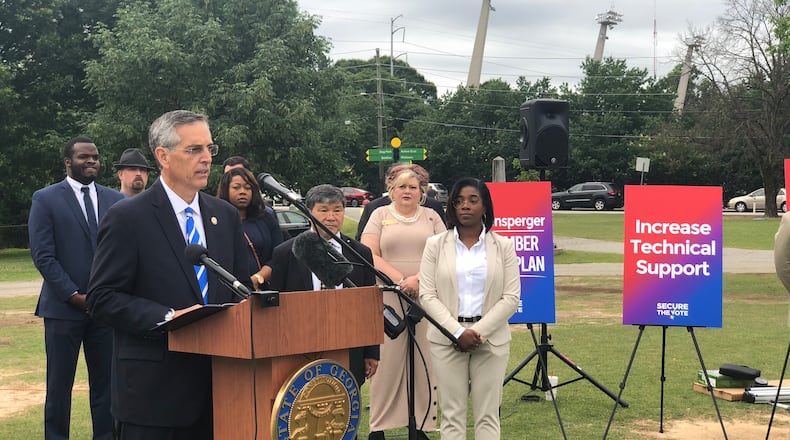Calls for monumental changes to Georgia’s elections arrived Wednesday, with elected officials from both parties demanding more voting locations, shorter lines and a management overhaul in Fulton County, where voters experienced the longest waits.
The proposals came after a debacle in Georgia's June 9 primary that left some voters in line for hours because of precinct closures, voting machine problems and complications stemming from the coronavirus pandemic.
These efforts are meant to avoid a repeat of those issues in November's presidential election, when three times as many in-person voters are expected. Turnout could exceed 5 million voters.
In separate events, Republican Secretary of State Brad Raffensperger and Democratic legislators from Fulton heaped blame Wednesday on the county's elections office. Fulton voters crammed into precincts with few voting machines and a shortage of trained poll workers.
Other parts of the state also had problems, especially in densely populated areas with high turnout, but 70% of the problems statewide occurred in Fulton, Raffensperger said.
“This is about accountability,” Raffensperger said, making his first public comments since election day in Piedmont Park, where voters waited three hours or more to vote at Park Tavern. “Fulton didn’t execute the way we wanted and that voters deserved. I know this: Every person involved in elections wants to get it right, even those in Fulton.”
Raffensperger said he’ll push legislation to give the State Election Board, where he’s the chairman, the power to intervene in county elections management. Raffensperger’s office didn’t provide details about how his office would manage local elections.
He also plans to provide far more tech support in voting places to avoid the kind of difficulties with the state’s $104 million voting system that delayed some poll openings last week.
Another bill introduced Tuesday would dissolve the Fulton elections board.
"Fulton voters have fundamentally lost faith in the state and the county as institutions that can administer properly," said state Rep. Josh McLaurin, a Democrat from Sandy Springs who waited in line the last day of early voting for 4 1/2 hours.
It’s unclear whether government officials can correct all election problems in time for November. If social-distancing requirements are still in place, few people will be able to vote at a time, guaranteeing long waits.
Precinct closures, especially at churches that refused to allow voters inside, also led to lines. Poll workers, many of whom are older than 70 years old, backed out of the job. And Fulton has demonstrated 20 years of difficulties running elections, as documented by news articles printed on poster board at Raffensperger's press conference.
Unless the coronavirus subsides, those problems will resurface during the general election.
“You can say you want to make changes, but until I see them, it’s just an empty promise,” said Chris Bruce, the political director for the American Civil Liberties Union of Georgia. “If the people aren’t seeing changes, they’re no longer going to have trust or faith in the system.”
Though Raffensperger said he wants to increase advance voting in the general election, he announced Wednesday that he wouldn't repeat a program that sent absentee ballot request forms to 6.9 million active voters in Georgia. He said his office lacks funding to mail request forms again.
Instead, he’ll create a website where voters can request absentee ballots themselves.
“That online portal should have been set up by the secretary of state before,” Fulton Elections Director Richard Barron said at a County Commission meeting Wednesday. “No mature organization would set up a transactional business at this volume. … It’s just not the way to do it.”
Raffensperger’s plan drew instant scorn from the voting rights group Fair Fight Action, which Democrat Stacey Abrams founded after narrowly losing the 2018 election for governor.
“By refusing to send mail-in ballot applications to Georgia voters, he is willfully making voting lines longer,” Fair Fight Action CEO Lauren Groh-Wargo said. “Fair Fight Action will continue to hold him accountable and demand that he do his job.”
Fulton lost about 35 of its 198 precincts before the primary, and there’s no guarantee those voting locations will come back in time for the general election. Besides Fulton, precincts in 19 other counties were held open late on election night
Raffensperger lacks authority to open precincts or hire poll workers on his own, but he said his office would reach out to groups such as the Veterans of Foreign Wars, Rotary Clubs and sororities to ask them to host voting precincts.
“That’s a very difficult task. People want the convenience of voting, but they don’t want to open up their communities to us,” said Deidre Holden, the elections supervisor for Paulding County.
One area where Raffensperger can make a difference is with the state’s new voting system, which introduced paper ballots to Georgia elections for the first time in 18 years.
Poll workers, some of whom lacked much training, struggled to start computers, log in and hook up the system correctly.
Raffensperger said he wants a technician in each of the state’s 2,600-plus precincts in November, a vast increase over the 175 technical support staff available June 9.
Improvements to elections will have to roll out quickly, with Aug. 11 runoffs and the Nov. 3 presidential election approaching.
Fulton Commission Chairman Robb Pitts said now is the time to plan rather than change elections management. Replacing the county’s previous elections director in 2012 led to a disaster in that year’s presidential election, he said.
“There are times when heads should roll,” Pitts said. “But this is not one of them in my judgment.”
Raffensperger’s election proposals
- Tech support staff in precincts on election day
- More hands-on training for poll workers
- Add polling places and send more equipment to high-turnout precincts
- Create a state website for voters to request absentee ballots
Keep Reading
The Latest
Featured






